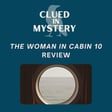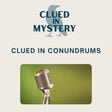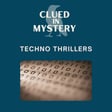Become a Creator today!Start creating today - Share your story with the world!
Start for free
00:00:00
00:00:01

Agatha Christie (part 2)
In the second episode of the Agatha series, Brook and Sarah discuss some of the tropes she used and what rules of mysteries she created and broke.
RESOURCES
Agatha Christie, An Autobiography Agatha Christie (1977)
Agatha Christie’s Secret Notebooks: Fifty Years of Mysteries in the Making John Curran (2009)
Agatha Christie's Murder in the Making: Stories and Secrets from Her Archive John Curran (2011)
Women of Mystery Martha Hailey DuBose (1992)
For more information: cluedinmystery.com Instagram: @cluedinmystery Contact us: hello@cluedinmystery.com Music: Signs To Nowhere by Shane Ivers - //www.silvermansound.com
Transcript
Introduction and Episode Focus
00:00:11
Speaker
Welcome to the Clued in Mystery podcast. I'm Sarah. And I'm Brooke. And we both love mystery. OK, it's our second episode, Brooke. And we're going to talk a little bit more about Agatha Christie, this time diving a little bit deeper into some of the influence that her work has had on cozy mysteries, as well as some of the interpretations of her work.
Film Adaptations and Time Settings
00:00:36
Speaker
So, you know, I was thinking about how almost every film adaptation that I've seen of her work, it stays pretty true to the time. You think about Murder on the Orient Express, it's set when she said it, right? We don't see, you know, modern day or present day adaptations. And I wonder why that is.
00:01:02
Speaker
It's interesting, isn't it? Because other authors' work sort of gets extrapolated into different time periods. And we'll talk more about that in future episodes with some other authors. But you're exactly right. Any film or TV adaptation have really stayed true to the time period that Christie wrote them in.
00:01:26
Speaker
You know, I wonder if that's, you know, kind of respect for her place in the genre, right? You'd have to be a pretty brave person, I think, to try and adapt her work for
Christie's Influence and Real-world Events
00:01:40
Speaker
today. And, you know, maybe, maybe Poirot wouldn't work if he had a cell phone.
00:01:45
Speaker
as a character or if everybody else had cell phones. She was not afraid to talk about a current event. I was thinking of in the Orient Express, she doesn't hide the fact that she's kind of referring to the Lindbergh
00:02:02
Speaker
baby kidnapping, right? And I was surprised to learn that that case hadn't even been resolved. Like the person hadn't even been sentenced yet. So it was a very fresh, you think about the memes, is it too soon? Agatha didn't think it was too soon. She would go ahead and go for it and put it in her work.
Cozy Mystery Tropes and Settings
00:02:27
Speaker
And so how much of her stories hinge upon or are work because of the details that she would put in that were, you know, there's a lot of things that have to do with the world wars and the way different cultures interacted with each other because of what was going on in the climate of the world. So it would be a daunting task I think for somebody to bring those into another time period.
00:02:53
Speaker
Yeah, I agree. As a reader or as a viewer, I'm, I'm quite happy to watch something that's or read something that's set in another time. Right. Like, I don't know if it would be the same. And certainly there's, you know, if you look at her influence on popular culture, right? Like there's a lot, uh, in the cozy mystery genre, you know, a lot of books are published every year in that genre. There's loads of television shows.
00:03:21
Speaker
Midsomer Murders has been, I don't know how, 20 or 21 or maybe even more seasons of that. That I would say is a pretty cozy series. Maybe what people have done is they've put their own spin on some of those tropes that she established.
00:03:40
Speaker
right? And some of those, you know, if you think about when you think about a cozy, you know, what are the elements of it, right? It's a small community. So, you know, she wrote a lot of Manner House where it's, you know, a family or it's a group of people who are together in the same environment. And so we see that in cozy mysteries that are set in small towns or, you know,
00:04:08
Speaker
more intimate environments, right? So rather than people adopting her stories, they're using elements of her stories in their own.
Breaking Conventions and Controversies
00:04:19
Speaker
I think that that's a really good way to look at it. And I think it does come back to something you said earlier, which is it's like maybe we don't mess with the queen of crime. Maybe we don't adapt her stories. But certainly in reverence to the tropes and the components that she popularized, then we can take her lead and create new things from that. And I think that you're right. I think that's exactly what's happened.
00:04:48
Speaker
And that's not the same for all authors, as we'll see, for whatever reason, whether it's just the highly skilled.
00:04:57
Speaker
genius of her work, if you will, or the fact that there are those different historic components that need to stay true. I think that's exactly what's happened. And as you said, there's lots of contemporary stories. I mean, we do see cozies with cell phones, but we can't really imagine Poirot with a cell phone. No, I just I don't I don't think that would work. But now now I kind of want to
00:05:26
Speaker
Try and imagine that. A common day for O. Yeah. Think of all the information he would have at his fingertips. He would be more knowledgeable than ever.
00:05:38
Speaker
I bet Poirot would refuse to use a cell phone. I think you're exactly right. Maybe that's what would happen. But all the other characters would have them, right? And so how would that change the dynamic of those mysteries? Oh, man. And I mean, I'm thinking of, and then there were none. You can set it on a remote island that doesn't have cell phone service. And so you could still kind of do that.
00:06:07
Speaker
in a modern day setting. And in fact, I think you've seen that, yeah, for sure. Yeah. And it works, right? That's the, you know, there's an avalanche or there's, you know, whatever thing that it takes out the contemporary technology and it puts us back and it sets up the same sort of scenario that you might have in a Christie novel where, you know, then we're back to and then there were none.
00:06:33
Speaker
Isn't it funny, contemporary writers are figuring out ways to take us back in time so that we don't have all those technological advances. You can't just call for the ferry and then there were none because the cell phone towers out or whatever.
00:06:50
Speaker
I think the other interesting thing that I noted when reading some of her stuff recently was how she breaks some of what we consider to be the rules of cozy mysteries, right? And you could argue that she probably set the rules.
00:07:09
Speaker
For sure. But in a couple of her stories, she has children as the victims, which I don't think that would be considered a cozy in in today's interpretation of the genre. Whereas, you know, yeah, I can think of two or three of her works have kids who are killed.
00:07:31
Speaker
In this day and age, we would classify those as more like a horror mystery. There could be children who are the victims or involved in the crime, but we put that in a different genre. You're right. I also think of some of her stories where children are either the perpetrators or fallout victims.
00:08:00
Speaker
We wouldn't consider those cozies anymore. You know, I'm not sure that we would pull her work out of that genre. You know, I think for most people, when you hear Agatha Christie, you associate it with with cozies. And, you know, I'm thinking of the Halloween party where where one of the or where the victim is is a child. The rest of the story is a classic cozy.
00:08:27
Speaker
Right. And so, yeah, I just I think that's it struck me a couple of times that she breaks some of these rules, but also she was setting those rules. So I guess she could break them. Yeah. And I think that we also look at the time period that it's set because she breaks other conventions or maybe politically correct conventions that we have now.
00:08:54
Speaker
that we would no longer do. I mean, there's definitely some racial slurs in her work. And if it's not completely straight out said, there's definitely feelings that she gives or kind of throws shade on a culture as if like, oh, they're obviously going to be the perpetrator because they're X.
00:09:18
Speaker
whatever race. And we would not do that anymore either. That wouldn't be appropriate in any genre. So I think some of those things are just because of the time that she's writing in. But I go back to the fact, not with the discrimination, but with the idea that a child is the victim, I go back to the fact that she also wasn't afraid to push the envelope on some things.
00:09:44
Speaker
She wasn't afraid to bring up some current events that were maybe a little bit raw. She was okay to shock people and make her stories. That's what brought out the emotion and the connection to her stories. You wanted to know who this perpetrator was that would possibly do this to a child. I think that she also was just unafraid to write the story. Again, not saying that it would happen now, but I wonder how much of that was a choice
00:10:14
Speaker
for her to make the story that much more impactful.
00:10:18
Speaker
Yeah, that's that's really interesting. And I don't know how those stories were interpreted at the time. Right. Like, was it controversial? True. Right. I will note one thing that I know was very controversial that she wrote was the murder of Roger Aykroyd because of a broken rule that we, you know, we talk about the rules of mystery, things you do and don't do. And I mean, spoiler alert, the narrator is the
00:10:48
Speaker
is the killer in the murder of Roger Ackroyd and that was so controversial because true mystery lovers thought you can't do that you know that she played a trick on them or so she very intentionally broke a mystery rule there and I will say became wildly popular because of all the talk surrounding
00:11:10
Speaker
the murder of Roger Ackroyd. So then maybe is she the original, unreliable narrator? Or she uses that and perhaps the first example of that. Because you think about some of the wildly popular books that have come out recently that rely on that device.
00:11:33
Speaker
Yes. Right? Girl on the train, Gone Girl. Yeah, Gone Girl is like the epitome of that, that the big twist is the fact that this was an unreliable narrator.
00:11:49
Speaker
I love it as a device and some people hate it. And so I can see how this was such a stir in 1926 because some people loved it and they were thrilled by the twist and other people just absolutely thought it was the most terrible thing that she could do to them. But I think you're right. If it wasn't the first time, it was definitely the first time that got the public's attention and it was
00:12:12
Speaker
you know, a popular topic of conversation. And now we're seeing it a lot again in our mystery fiction today. But I think you're right. We don't really see that in cozy mysteries. No, true. You know, Gone Girl or Girl on the Train would be more domestic thrillers, I think is probably where they fit on the bookshelf, right? I would agree. Oh, now I want to see if I can write a cozy with an unreliable narrative.
00:12:42
Speaker
Oh, this is like Madge's dare to Agatha to write the detective fiction. So, okay, I bet you can't do it, Sarah. I bet you can't write a cozy mystery with an unreliable narrator. Go for it. Oh, well, we'll see, I guess.
00:13:03
Speaker
That would be fun, I think. Well, now you've just got me thinking, I guess the next time I'm doing the dishes, that'll be what I'm trying to work out is how can I pull that off? Perfect timing to do it. I love that. Okay, well, we just talked about doing the dishes and filling in a plot hole.
Christie's Writing Process
00:13:29
Speaker
In your research into Agatha Christie, Brooke, did you come across anything about how she wrote and what her process was? Yeah, a little bit. I really like John Curran's books. With the assistance of Christie's grandson, Matthew Pritchard, they discovered a lot of her
00:13:49
Speaker
dictation tapes a few years back and so Karen has taken the those and some of her old notebooks and so it's really fun I will put links to his books in the show notes because you can look and see what her little workbooks that she wrote notes to herself look like and it's really fun but apparently she preferred to do longhand first drafts and then
00:14:16
Speaker
type into the typewriter. She had a favorite typewriter for kind of a second draft and cleanup draft. And then in later life, apparently she needed to use a dictaphone because her wrists and hands started to bother her. But she said that she would first come up with a murder method and then figure out who the murderer was and try to come up with an interesting motive, which she always did.
00:14:43
Speaker
and then start to fill in the rest of the suspects who would have interesting connections. Aside from the dishes, advice that she gives us, she also said that she would take long walks to work out plot points and that she would talk dialogue out loud back and forth to herself on her long walks. And so I found that charming.
00:15:04
Speaker
Oh, I can just imagine her doing that. And I mean, that's really good advice, right? Go for a walk, kind of get out of your space. And I think for me, that's certainly where things occur to me is often when I'm running or just doing something totally unrelated. And then I'll have to be like, okay, just I need a moment so that I can write this down.
00:15:31
Speaker
I remember when, um, when I was first getting started writing in the advice list, you know, to keep a little notebook in your back pocket all the time. Uh, because like you say, you're out on a walk or you're doing something where your mind is occupied and you get a little idea
00:15:46
Speaker
But thankfully, back to cell phones. Now we have our cell phones on us at all times. So I'll make myself a little note in there. And I love the fact that it's very similar. When you read these examples of Agatha Christie's notebooks, you'll be like, what in the world was she talking about? Because there are these seemingly disjointed words. That's really similar to what my notes to myself and my cell phone look like. Oh, that's good to know.
00:16:17
Speaker
We're not alone. No, we're not alone. Well, I think that's about it for this episode. Brooke, is there any final comments you want to share? No, I've had a wonderful time talking today with you about some of these ideas about how her work has extrapolated into our contemporary mysteries. This was really fun, Sarah.
00:16:40
Speaker
Good. I'm enjoying it too, Brooke. And next time we will be speaking with someone who's an expert on all things mystery. And I'm really looking forward to that. I'm so excited for our very first
00:16:57
Speaker
interview.
Conclusion and Credits
00:16:58
Speaker
Thanks for joining us today on the Clued In Mystery podcast. We'd love to hear what you think. You can send us an email at hello at cluedinmystery.com or follow us on social media and our handle everywhere is at cluedinmystery.
00:17:15
Speaker
Clued in Mystery is produced by Brooke Peterson and Sarah M. Stephen. Music is by Shane Ivers at Silvermansound.com. Visit us online at cluedinmystery.com or social media at Clued in Mystery. If you liked what you heard, please consider subscribing, leaving a review, or telling your friends.
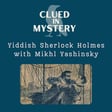
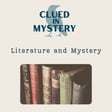
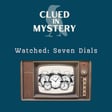
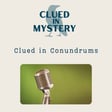
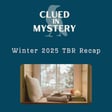
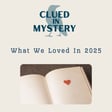
![[Re-release] Anthony Berkeley image](https://media.zencastr.com/cdn-cgi/image/width=112,quality=85/image-files/61e1c276e3ec42007857cff9/e7c778ac-a2ba-4809-9a5c-7cd39d167834.jpg)
![[Bonus] Wake Up Dead Man image](https://media.zencastr.com/cdn-cgi/image/width=112,quality=85/image-files/61e1c276e3ec42007857cff9/e276ac32-e664-464f-956c-7699bdb60aa5.jpg)
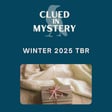
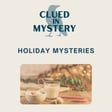
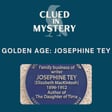
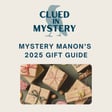
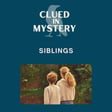

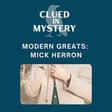
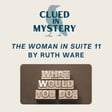
![[Bonus] Read Along: Daughter of Time image](https://media.zencastr.com/cdn-cgi/image/width=112,quality=85/image-files/61e1c276e3ec42007857cff9/b953ad72-c43e-48ca-a18a-b3c216ab90ee.jpg)
